توضیحات
مقاله های انگلیسی
توجه: برای تهیه هر یک از مقاله ها می توانید با ادمین سایت انستیتو پارادوکس درمانی تماس بگیرید. لطفاً به “راههای تماس با ما” در سایت مراجعه کنید.
مشخصات مقاله | کد مقاله |
Besharat, M. A. (2001). Management strategies of sexual dysfunctions. Journal of Contemporary Psychotherapy, 31 (2), 161-180. | 001 |
Besharat, M. A. (2001). The predictive value of family expressed emotion. Iranian Journal of Medical Sciences, 26 (12), 110-115. | 002 |
Besharat, M. A. (2003). What are the main differences between behavioral and systems therapy with couples? A critical account. Journal of Contemporary Psychotherapy, 33 (2), 109-127. | 003 |
Besharat, M. A. (2003). Relation of attachment style with marital conflict. Psychological Reports, 92, 1135-1140. | 004 |
Besharat, M. A. (2003). Parental perfectionism and children’s test anxiety. Psychological Reports, 93, 1049-1055. | 005 |
Besharat, M. A., Eisler, I., & Dare, C. (2001). The Self and Other-Blame Scale (SOBS). The background and presentation of a new instrument for measuring blame in families. Journal of Family Therapy, 23, 208-223. | 006 |
Besharat, M. A. (2004). The outcome of psychotherapy for eating disorder patients: the predictive value and clinical implications of measuring self-disclosure. Psychological Research, 13 (1-2), 29-54. | 007 |
Besharat, M. A. (2005). Evaluating the psychometric properties of Farsi version of the Positive and Negative Perfectionism Scale. Psychological Reports, 97, 33-42. | 008 |
Besharat, M. A. (2006). What are the elements of good communication within a couple relationship? Journal of Psychological Science, 16, 5-25. | 009 |
Besharat, M. A. (2007). A Measure of Patient’s Response Style to Therapist and Therapy: The Development of the Patient Response Style Scale (PRSS). Acta Medica Iranica, 45, 415-423. | 0010 |
Beaharat, M. A. (2007). Psychometric properties of Farsi version of the Emotional Intelligence Scale-41 (FEIS-41). Personality and Individual Differences, 43, 991-1000. | 0011 |
Besharat, M. A. (2007). Reliability and factorial validity of a Farsi version of the Toronto Alexithymia Scale with a sample of Iranian students. Psychological Reports, 101, 209-220. | 0012 |
Besharat, M. A., Rostami, R., Pourhosein, R., & Mirzamani, M, (2007). Assessing reliability and validity of Farsi version of the Toronto Alexithymia Scale-20 in a sample of opioid substance use disordered patients. Iranian Journal of Psychiatry, 4, 133-139. | 0013 |
Besharat, M. A. (2007). Psychometric properties of Farsi version of the Toronto Alexithymia Scale-20 (FTAS-20). International Journal of Psychology, 1, 64-79. | 0014 |
Besharat, M. A. (2007). Assessing reliability and validity of the Farsi version of the Toronto Alexithymia Scale in a sample of substance-using patients. Psychological Reports, 102, 259-270. | 0015 |
Besharat, M. A. (2008). The relationship of personality to eating disorders. Iranian Journal of Psychiatry, 3, 1-8. | 0016 |
Besharat, M. A., (2008). Psychometric characteristics of Persian version of the Toronto Alexithymia Scale-20 in clinical and nonclinical samples. Iranian Journal of Medical Sciences, 33, 1-6. | 0017 |
Besharat, M. A. (2009). Reliability and factorial validity of Farsi version of the Positive and Negative Perfectionism Scale. Psychological Reports, 105, 99-110. | 0018 |
Besharat, M. A., & Shahidi, S. (2010). Perfectionism, anger, and anger rumination. International Journal of Psychology, 45, 427-434. | 0019 |
Besharat, M. A. (2010). Relationship of alexithymia with coping styles and interpersonal problems. Procedia Social and Behavioral Sciences, 5, 614-618. | 0020 |
Besharat, M. A. (2010). Psychometric properties of the sport stress coping styles scale. Procedia Social and Behavioral Sciences, 5, 609-613. | 0021 |
Besharat, M. A., Azizi, K., & Poursharifi, H. (2011). The relationship between parenting styles and children’s academic achievement in a sample of Iranian families. Procedia Social and Behavioral Sciences, 15, 1280-1283. | 0022 |
Besharat, M. A., Azizi, K., & Poursharifi, H. (2011). The relationship between parenting styles and children’s perfectionism in a sample of Iranian families. Procedia Social and Behavioral Sciences, 15, 1276-1279. | 0023 |
Besharat, M. A., Pourhosein, R., Rostami, R., & Bazzazian, S. (2011). Perfectionism and fatigue in multiple sclerosis. Psychology and Health, 4, 419-432. | 0024 |
Besharat, M. A., Behpajooh, A., Poursharifi, H., & Zarani, F. (2011). Personality and chronic fatigue syndrome: The role of the five-factor model. Asian Journal of Psychiatry, 4, 55-59. | 0025 |
Besharat, M. A. (2011). Factorial and cross-cultural validity of a Farsi version of the Anger Rumination Scale. Psychological Reports, 108, 317-328. | 0026 |
Besharat, M. A., & Shahidi, S. (2011). What is the relationship between alexithymia and ego defense styles? A correlational study with Iranian students. Asian Journal of Psychiatry, 4, 145-149. | 0027 |
Besharat, M. A., & Pourbohlool, S. (2011). Moderating effects of self-confidence and sport self-efficacy on the relationship between competitive anxiety and sport performance. Psychology, 7, 760-765. | 0028 |
Besharat, M. A. (2011). Development and validation of Tehran Multidimensional Perfectionism Scale. Procedia Social and Behavioral Sciences, 30, 79-83. | 0029 |
Besharat, M. A. (2011). Development and validation of Adult Attachment Inventory. Procedia Social and Behavioral Sciences, 30, 475-479. | 0030 |
Besharat, M. A., & Ghiabi, B. (2012). Anger and aggression in contact and non-contact sports. Comprehensive Psychology, 1, 9. | 0031 |
Besharat, M. A., Etemadi Nia, M., & Farahani, H. (2013). Anger and major depressive disorder: The mediating role of emotion regulation and anger rumination. Asian Journal of Psychiatry, 6, 35-41. | 0032 |
Besharat, M. A., & Pourbohlool, S. (2013). Mediation effect of anger rumination on the relationship between dimensions of anger and anger control with mental health. International Journal of Research Studies in Psychology, 2, 71-80. | 0033 |
Besharat, M. A., & Khajavi, Z. (2013). The relationship between attachment styles and alexithymia: Mediating role of defense mechanisms. Asian Journal of Psychiatry, 6, 571-576. | 0034 |
Besharat, M. A., & Shahidi, V. (2013). The moderating role of attachment styles on the relationship between alexithymia and interpersonal problems in an Iranian population. International Journal of Psychological Studies, 5, 60-67. | 0035 |
Besharat, M. A., & Shahidi, V. (2014). Mediating Role of Cognitive Emotion Regulation Strategies on the Relationship Between Attachment Styles and Alexithymia. Europ’s Journal of Psychology, 10(2), 352-362. | 0036 |
Besharat, M. A., & Pourbohlool, S. (2014). The moderating effects of inner-directed and other-directed behavior styles on the relationship between organizational commitment and organizational citizenship behavior. International Journal of Research Studies in Psychology, 3, 75-84. | 0037 |
Besharat, M. A., & Salimian Rizi, M. M. (2014). The relationship between attachment styles and alexithymia: Mediating role of self-regulation. International Journal of Research Studies in Psychology, 3(4), 89-98. | 0038 |
Besharat, M. A., Naghshineh, N., Ganji, P., & Tavalaeyan, F. (2014). The Moderating Role of Attachment Styles on the Relationship of Alexithymia and Fear of Intimacy with Marital Satisfaction. International Journal of Psychological Studies, 6, 106-117. | 0039 |
Besharat, M. A., Issazadegan, A., Etemadinia, M., Golssamanlou, S., & Abdolmanafi, A. (2014). Risk factors associated with depressive symptoms among undergraduate students. Asian Journal of Psychiatry, 10, 21-26. | 0040 |
Besharat, M. A., Mirjalili, R., & Bahrami Ehsan, H. (2015). The mediating role of meta-cognitive beliefs and cognitive emotion regulation deficit on the relationship between cognitive perfectionism and worry in generalized anxiety disorder. Fundamentals of Mental Health, 17(3), 115-122. | 0041 |
Besharat, M. A., Kamali, Z. (2016). Predicting obsessions and compulsions according to superego and ego characteristics: A comparison between scrupulosity and non-religious obsessive-compulsive symptoms. Asian Journal of Psychiatry, 19, 73-78. | 0042 |
Besharat, M. A., & Atari, M. (2017). Psychometric evaluation of a Farsi translation of the Big Three Perfectionism Scale. Personality and Individual Differences, 113, 5-12. | 0043 |
Besharat, M. A., Ramesh, S. (2017). The Relationship between Worry and Anger Rumination with Adjustment Problems to Heart Disease: The Mediating Role of Difficulties in Emotion Regulation. Heart and Mind, 1, 141-148. | 0044 |
Besharat, M. A., Nabavi, S. M., Geranmayehpour, S., Morsali, D., & Haghani, S (2017). Mindfulness-based Stress Reduction (MBSR) Program: the Effect of a Novel Psycho-interventional Method on Quality of Life, Mental Health, and Self-efficacy in Female Patients with Multiple Sclerosis: A Randomized Clinical Trial. Journal of Biology and Today’s World, 6(11), 211-215. | 0045 |
Besharat, M. A., Ramesh, S., & Moghimi, E. (2018). Spiritual health mediates the relationship between ego-strength and adjustment to heart disease. Health Psychology Open, 1-8. | 0046 |
Besharat, M. A., Khadem, H., Zarei, V., & Motavalli Haghi, S. A. (2019). Predicting Anxiety Symptoms Based on Confrontation With Existential Issues: The Moderating Role of Defense Mechanisms. Practice in Clinical Psychology, 7(4), 235-244. | 0047 |
Besharat, M. A., Atari, M., & Mirjalili, R. S. (2019). Transdiagnostic Processes in Generalized Anxiety Disorder and Obsessive-Compulsive Disorder: Worry, Cognitive Avoidance, Intolerance of Uncertainty, and Metacognitive Beliefs. Practice in Clinical Psychology, 7(4), 281-290. | 0048 |
Besharat, M. A., & Naghipoor, M. (2019). The Application of a New Model of Paradox Therapy for the Treatment of Illness Anxiety Disorder: A Case Report. Clinical Case Reports International, 3, 1-3. | 0049 |
Besharat, M. A., & Naghipoor, M. (2019). Paradox therapy for the treatment of social anxiety disorder: A case study. Journal of Systems and Integrative Neuroscience, 6, 1-5. | 0050 |
McCutcheon, L. E., Green, T. D., Besharat, M. A., Edman, J. L., Wenger, J. L., & Shabahang, R. (2019). Values of College Students in Iran and the United States Who Admire Celebrities. Psychological Reports, 1-19. | 0051 |
Besharat, M. A., Khadem, H., Zarei, V., & Momtaz, A. (2020). Mediating Role of Perceived Stress in the Relationship between Facing Existential Issues and Symptoms of Depression and Anxiety. Iranian Journal of Psychiatry, 15(1), 81-88. | 0052 |
Ramesh, S., Besharat, M. A., & Nogh, H. (2020). Spiritual well-being and coronary artery diseases severity: Mediating effects of anger rumination and worry. Health Education Journal, 1-12. DOI: 10.1177/0017896920976697 | 0053 |




